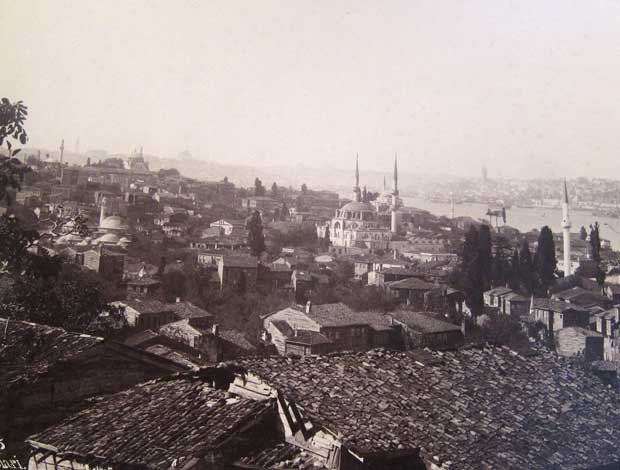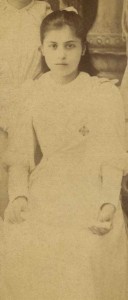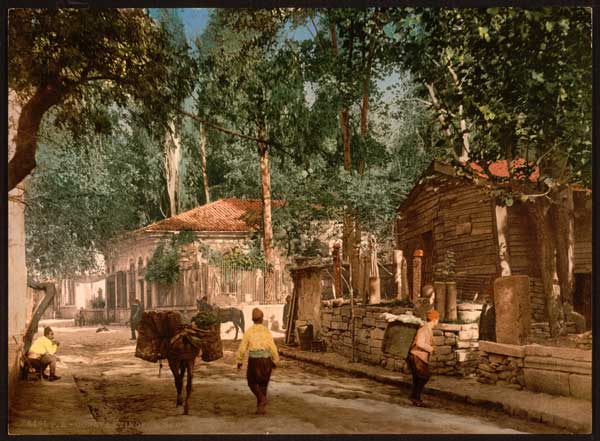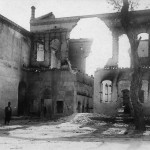I was born in a typical, two-story wooden house that had been painted red. The windows looking out onto the street had curtains that were almost always closed, because, just in front of our house was a Greek grocery that doubled as a tavern.
The members of my family would spend the day in the rooms towards the back of the house, where the windows opened out onto a series of groves.
Beyond those groves lay the Turkish neighborhoods. In those neighborhoods were magnificent mosques whose slim, white minarets joined black cypress trees on the skyline. From a distance, the glistening blue Bosphorus looked like a ribbon and the silhouette of Stamboul—shrouded in a pink mist in the morning, a golden mist during the day and a blue mist in the evening—looked like a colorful, ever-changing, ethereal wonderland.

As a child, I was dazzled by the rays of light that seemed to catch fire as they reflected off the golden domes of the mosques. That vibrant, yet subtle panorama was the first to make a profound visual impression on me. Even before I could articulate my thoughts, these impressions produced powerful emotions in me—inspiring both laughter and tears—and later in life, when I saw the same sights again, I felt like I had already experienced them.
I remember spring mornings when those groves—the Gardens of Silihdar—were transformed into a paradise filled with fiery roses in bloom. Those roses overran the house; they adorned bare rooms, brought fragrance and color to white walls, and became toys for children. Their petals rained down on everything and everyone.
I remember how the wisteria tumbled down the trellis and, like a luxurious cape, masked the gloom of houses that had fallen into disrepair. Sunlight filtered through the leafy trees and created fleeting patterns on the ground. The cool breeze passed over people and plants like a caress and made young branches sway playfully.
I remember the warm, feverish nights, the sound of croaking frogs rising from the pond, the buzzing of the fireflies and the endless creaking of the artesian wells that seeped into my dreams, even during those sick, restless nights I often endured as a child. Sometimes I would hear a gardener from the steppes of Rumelia sing a distant, nostalgic song with a shepherd’s fife in hand.
I remember my suffering before the beauty of nature and my powerless yearning to possess what were only scents, colors, lights and dreams.
I loved to look closely at the sky as the white clouds outlined in gold slowly changed shape. I would occasionally see part of a larger cloud separate from the rest and float quickly through the blue sky. All of this came to life before my eyes and, with the limited understanding of a child, I gave meaning to those movements and transformations as I fixed my eyes on the fiery western horizon and the reddish bands sketched above it.
I remember the cool May rain that would fall in a hurried patter on the thirsty plants and red tile roofs. The rainwater used to gush from the gutters onto the wet, crumbling ground and create countless streams and tributaries in it. From the open windows, a fresh breath of crisp air would rush inside. The smell of newly plowed gardens and groves, fertile land and wet plants would spread through the air. And in the morning, the dew-covered flowers, satiated by the rain, smiled in that garden.
I remember walking along the small path in our garden and stepping on the spots of light that trembled in the shadows of the swaying branches. I remember the vague unease that suddenly took hold of me as I listened intently to the rustling of the trees and the whisper of the streams.
In that garden, royal apricot trees offered me their golden fruit. Blooming rosebushes anointed my childhood with their sweet fragrance and, with the light touch of my fingertips, beautiful red and white rose petals fell to my feet.
Over the course of my life, I have seen many places and have enjoyed the beauty of nature in many forms, but my memories of the Gardens of Silihdar have remained indelible. I have carried those gardens with me everywhere, and in them I have found refuge every time dark, menacing clouds have accumulated on my horizon.
***

Although outside, the garden and neighboring groves were filled with smiles and laughter, inside it was cold and gloomy.
My grandmother’s strict cleaning habits drove out any object that could have brought a small amount of pleasant disorder or whimsy into our lives. The walls of every room were plastered and painted white. All the rooms had wood floors, except for two, which were covered in straw mats. These floors were washed and scrubbed so often that our noses grew accustomed to the smell of wet wood.
At the back of each room, a divan—always covered in a white blanket—stretched from one side of the room to the other. The windows were dressed in white curtains ironed into crisp pleats. A round table covered in a white crocheted tablecloth held a water pitcher and a glass overturned on a crystal plate. We would eat our meals on the patio, which was paved with white marble. At night, we slept in white nightgowns on mattresses with rose and lavender scented sheets that were spread across the floor. Everything in our house was white as far as the eye could see.
There were no pictures on the walls, or any vases in any of the rooms. In Doudou’s eyes, my aunts were defiling the house any time they brought flowers from the garden and put them in jars. Only when the roses were in bloom did flowers fill the house in large numbers. Doudou could only tolerate the scent of roses, which she said smelled fresh. To her, other scents—both natural and artificial—were simply unacceptable for virtuous people.
Once winter arrived and the doors to the garden were closed, despair gripped my young soul.
Curled up on a white divan and nestled close to one of my aunts, I used to yearn for those rosebushes and the sunny, winding paths of our garden. I used to close my eyes and tell myself stories about roses who could talk and trees who frolicked down the street, almost forming a circle dance with their outstretched branches.
I was rarely allowed to enter the two places of refuge in the house. The first was Aunt Yeranig’s room where she worked alone on her yazmas. Aunt Yeranig was fiercely protective of her privacy. For me, her room was a mysterious sanctuary, and the joy of entering it was almost impossible to attain. The second was the largest room in the house where my aunts worked on their yazmas at their workbenches, sometimes together, sometimes alone.
For me, that room was full of wonder. The floor was covered in straw mats that creaked slightly under my aunts’ slippers; the divan was covered in colorful fabric, and the yellow curtains in the room were decorated with thick red stripes.
Their workbenches were the objects of my greatest curiosity. They were low tables in front of which my aunts Youghaper and Makrig—dressed in yellow, pink or blue entaris with big, colorful flowers—would sit cross-legged on cushions as they worked on their yazmas.
Along one side of the workbenches were clay bowls with red, yellow and purple paint. Only Aunt Yeranig used green and blue.
The leaves and flowers sketched on the yazmas would be given color and texture as soon as my aunts dipped their brushes in a color and started working. Chatting as they worked, my aunts would hang their painted yazmas in rows. They exposed my curious mind to the outside world. I did not understand most of what they discussed, but my newly stirred imagination nonetheless took flight and created a new world for myself with the fragments of their conversations.
I felt a special kind of love for my Aunt Youghaper, or Gogo as I called her. She was the oldest of her sisters and acted like a mother not only to me, but to my own mother. She was the one who looked after me, bathed me, dressed me and put me to bed at night. Gogo, with her dainty appearance, light chestnut-colored hair and dark eyes set deep in their sockets, took meticulous care of herself. Her hair was cut into bangs that fell to her eyebrows, and she was the only woman in the house who powdered her face with rice powder, despite the criticism she received for it. She also liked colorful fabrics. I remember that she had wanted to make a red velvet dress for many years, but never managed to do it, because her mother’s rigid opinions ruled over the house. Gogo would sometimes fall into a deep depression and, as if she were holding a grudge against the other members of the family, would work sadly and sullenly with her left hand pressed to her temple, since on those days her nervous facial tic would intensify. I would watch as tears silently rolled down her sunken cheeks. That portrait of sadness weighed heavily on my heart and tormented me. I did not know what to do to bring a smile to Gogo’s hopeless face, but from time to time I managed to do it. If she was in a good mood, Gogo was sweet and affectionate. I have never heard as many tender words as I have from her. Throughout our entire routine—dressing, undressing, etcetera—she never stopped enveloping me in loving whispers. She made all of my wishes come true with a kind of patience that knew no bounds. She would gently comb my hair, and to keep me busy, tell stories or sing in a soft, sad voice.
Aunt Makrig, on the other hand, had an impetuous personality. Her moods could change in an instant. Having a love for life and a cheerful disposition, but deprived of the same opportunities her brothers had to indulge themselves outside the home, she would sometimes erupt in a sudden rage and rebel—even against her mother—over something quite trivial.
She married late in life, only after her mother’s death. Her husband was a pathetic man for whom she harbored legitimate contempt until his death. But it was through that marriage that Aunt Makrig found independence and began a life that brought her endless happiness. Every evening, a tray of oghi would be prepared; guests, musicians and neighbors—both Armenian and Turkish—would gather and spend a delightful evening singing and playing music together.
If it so happened that a disagreeable neighbor complained about the festivities, and those grumblings reached Aunt Makrig, she would immediately put the neighbor in his or her place.
On short winter days when my aunts worked by the light of a lantern, my mother would sometimes carry me or take me by the hand into their workroom. In that room, they had installed a stove in order to dry the yazmas more quickly. The wood crackled in the fire and the lanterns flickered. The smell of paint coupled with the images I had sketched in my mind from my aunts’ conversations made me dizzy. My father would sometimes come home late. He would often work until midnight in his workshop, and occasionally, when he did, my aunts would forget to put me to bed. One by one, my uncles would return home from work—or more often from the tavern—and start talking about their jobs, their bosses and the men and women with whom they worked.
Aunt Makrig and my uncles—Aunt Youghaper was too good-natured and understanding—used to mercilessly ridicule their boss, Chevigents Partig. Partig’s brother Tateos was thought to be a complete fool and was nicknamed Aré in the neighborhood. My uncles would describe Aré’s exploits in the market and in the streets with big, hearty laughs. Occasionally, they would tell old stories about their father and uncles. I would listen to these stories as if they were the most marvelous tales ever told. My joy would reach its peak when Uncle Dikran returned home from the tavern. Gangan, as I called him, had a dazzling personality. While his brothers Bedros and Boghos, always looking for a fight, would cause mayhem whenever they had too much to drink, Gangan was a happy drunk.
When he came home, Gangan would take me in his arms, lift me all the way to the ceiling and joke around with everyone in the room. And sometimes, stretched out on a straw mat, he would recite a destan or sing one of his own ashough songs. He used to write poetry in Turkish with Armenian letters; I managed to save some of his poems, and I have kept them to this day.
Uncle Dikran was well educated and knew modern Armenian, classical Armenian and Turkish very well. After graduating from the Sourp Khatch School in Scutari, he worked as a secretary for a Turkish merchant from Trabzon. One day, he left his job unexpectedly to wander through Anatolia, finally returning to Constantinople in a dreadful state. He later entered the yazma business and became a textile worker like his brothers Boghos and Bedros. In the heat of the summer and the bitter cold of the winter, they would all walk down to the shore to wash the yazmas and climb back up the hill with the wet yazmas on their shoulders. They would prepare them to be painted, distribute them among the neighbors and go to the tavern every night to console themselves after a hard day’s work.
Gangan was a handsome man with dark eyes, thick black hair and a bushy mustache. When he was half-drunk, he would whisper stories in my ear about khabadayis and their adventures. He would also tell me tales of other brave men who, rebelling against injustice, would disappear into the mountains and become eshguias. Uncle Dikran talked about these eshguias with so much admiration that, for a very long time, I thought that the noblest men in the world were bandits who took refuge in the mountains. Whenever Doudou listened to his stories, she would furrow her brow and stare off into the distance. If Gangan noticed Doudou’s stern expression, he would say half-seriously, half-jokingly:
—What’s wrong, Doudou? Are you unhappy?
Expressing her disdain, my grandmother’s pale lips did not deign to respond.
More often, Gangan would lament the powerlessness of his generation.
—Are we really Shirine’s grandchildren? Who would have thought that those tigers of men would bear housecats like us? Are we not men, too? Aré’s brother takes us by the nose and drags us wherever he likes. Cursed is this worthless life.
One winter evening past midnight, Gangan brought home a tobacco smuggler who was wanted by the government. Smugglers were usually Circassian, but a few Armenians had started to join forces with them. Uncle Dikran established ties with these smugglers; his adventurous spirit seemed to invigorate them. The smugglers were armed and were constantly fighting against the government, especially against the French government, which had a monopoly on the tobacco industry at the time. The farmers who grew tobacco in the villages around Constantinople tried to help them in any way they could. The government officials and gendarmes called in to subdue the smugglers were chosen from similarly brave men who were under strict orders to show no mercy. The heroic battles that ensued would take place just outside of Scutari and would always end in bloodshed.
The members of my family were stunned by Gangan’s audacity. I think I remember the fugitive’s face: sharp like the blade of a sword with small, sparkling eyes and a swarthy complexion. I was barely four years old at the time.
When the fugitive left three days later, my father talked to Doudou about Uncle Dikran’s behavior. He had decided to become an eshguia and had plans to disappear into the mountains. They both thought he needed to be stopped and hastily married him to the daughter of a fisherman named Nigot with the hope that he would settle down and put an end to his perpetual wandering.
Gangan never left Scutari again and, the more time passed, the more heavily he drank. Sometimes, he would pound on our door late at night in a drunken stupor and wake up the entire household with his ramblings about the unrealized ambitions of his youth. He would later sigh deeply and cry:
—Shame on us for calling ourselves Shirine’s grandchildren. Look at him and look at us! We are the unworthy products of our time.
Translated by Jennifer Manoukian
Top photo: Scutari, Constantinople, Turkey, between ca. 1890 and ca. 1900. Photo from Library of Congress Prints and Photographs Division.
Related pieces
- The House (The Gardens of Silihdar) - March 13, 2016
- In the Ruins - March 13, 2016
- The Man - March 13, 2016





